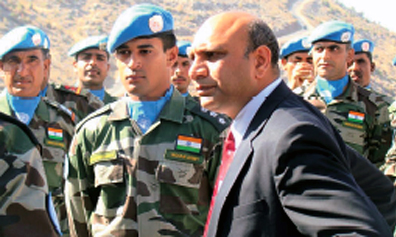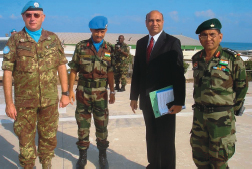|
New Delhi. India will continue to support the United Nations in its
peacekeeping operations. This was stated by Minister of State for Defence Pallam
Raju while interacting recently with Indian troops stationed in Lebanon as part
of the UN Interim Force in Lebanon UNIFIL). Praising the Indian
infantry soldiers, 900 of whom are deployed on the Eastern position of South Lebanon
after the 2006 Israel-Hezbollah 34-day war, the minister pointed out that the
Indian peacekeepers had consistently won admiration from the UN authorities for
their efforts, as they invariably helped in the social development of the areas
of their posting rather than just apply force. In Lebanon for instance,
Indian Army doctors were helping people with medical camps, veterinary hospitals,
rehabilitation centres and helping amputees walk by giving them Jaipur foot, an
artificial leg developed in India. At the same time, the Indian soldiers
helped the local population with construction of schools, digging of bore wells,
vocational training and sports functions for school children. Mr Raju thanked
the soldiers for winning the hearts of the local people. Although Indian
soldiers are deployed on a number of UN missions at any given time, this was the
first visit by an Indian minister in five years to an area of UN deployment. One
advantage that the Indian soldiers have is their ability to communicate in English,
and familiarization with state-of-the-art equipment used by peacekeepers from
other countries, particularly the weapons and systems supplied by western countries
like the US and UK. This helps in interoperability and development of joint doctrines
with troops from other countries on UN missions. It may be noted that India
has also refused to be drawn into conflicts where there is no UN mandate. As a
founder member of the United Nations, India has been a firm supporter of the UN
principles and has made significant contributions throughout in all its efforts,
and they integrate well into the UN network. It is the third largest contributor
of troops to the United Nations at present.  So
far, India has taken part in 43 peacekeeping missions in four continents with
more than 90,000 troops all over the world from Korea to Congo, Gaza, Somalia,
Lebanon and Sudan etc. Presently, India has deployed 8,875 personnel in UN peacekeeping
operations worldwide. So
far, India has taken part in 43 peacekeeping missions in four continents with
more than 90,000 troops all over the world from Korea to Congo, Gaza, Somalia,
Lebanon and Sudan etc. Presently, India has deployed 8,875 personnel in UN peacekeeping
operations worldwide.
The first deployment started in 1950’s, when
India sent troops to Korea in 1953-54, and as many as 124 of them have made the
supreme sacrifice since then on various UN missions. In Korea, India provided
a paramedical unit to facilitate withdrawal of the sick and the wounded, and after
the ceasefire, India became the Chairman of the Neutral Nations Repatriation Commission.
One brigade group of the Indian Army participated in the operation in Korea, authorized
by the UN General Assembly through Uniting for Peace resolution. Indian troops
provided guards for the prisoners of war. The Chairman of the Neutral Nations
Repatriation Commission was Lt Gen KS Thimmaya and the Commander of the Custodian
Force to take custody of the Prisoners of War (numbering over 22,000) was Maj
Gen SPP Thorat. India has also provided 12 Force Commanders in various
UN Missions. Indian troops have taken part in some of the most difficult
operations, and their professional excellence has won them universal admiration.
Indian forces have demonstrated their unique capacity of sustaining large troop
commitments over prolonged periods. India has also offered one brigade of troops
to the UN Standby Arrangements. India has also contributed to peace in
the Middle East. The United Nations Emergency Force (UNEF) was created in 1956
following cessation of hostilities between Egypt and Israel.India provided an
infantry battalion, which accounted for the bulk of the UN force. Over 11 years,
from 1956 to 1967, more than 12,000 Indian troops took part in UNEF. Pursuant
to the Geneva Accord, an International Control Commission (ICC) for Indo-China
was set up in 1954. India was the Chairman of the Commission, which implemented
the ceasefire agreement between Vietnam, Laos, Cambodia and France. India provided
one infantry battalion and supporting staff until the ICC was wound up in 1970. The
UN faced one of its worst crises when war between the government and the secessionist
forces broke out in Congo. The UN operation in the Congo, ONUC, was unique in
many ways. The operation involved heavy casualties. It was also the first time
that the UN undertook an operation in an intra-State, rather than an inter-State
conflict. The operation upheld the national unity and territorial integrity of
the Congo. The Indian contingent lost 39 men in action in the Congo. The performance
of the Indian troops was distinguished by their discipline, self -restraint and
humanitarian concern. Indian Army provided a Force Commander and observers
for the Observer Mission in Yemen in 1963-64 (UNYOM). India also participated
in the UN operation in Cyprus UNFICYP). India provided three Force Commanders
to UNFICYP; Gen KS Thimmaya, Lt Gen PS Gyani and Lt Gen Dewan Prem Chand. The
UN set up a Military Observer Group to monitor the situation on Iran-Iraq border.
India provided military observers during the period 1988-90. Following the
end of the Gulf War, the UN established the UN Iraq-Kuwait Observer Mission (UNIKOM).
Indian observers were deployed there. The UN operation in Namibia considered
one of the success stories of the United Nations. Lt Gen Prem Chand of India was
the Force Commander. Indian military observers in Namibia were responsible for
the smooth withdrawal of foreign troops, elections and subsequent handing over
of the authority to the government. The UN established ONUMOZ to restore
peace and conduct elections in Mozambique. India provided a large contingent of
staff officers, military observers, independent headquarters company, and engineer
and logistics company. The operation has ended successfully.  In
recent times, one of the biggest peace keeping operations which was completed
successfully was the UN operation in Cambodia. India provided an infantry battalion,
military observers and a field ambulance unit. In
recent times, one of the biggest peace keeping operations which was completed
successfully was the UN operation in Cambodia. India provided an infantry battalion,
military observers and a field ambulance unit.
India has also regularly
sent military observers to various UN operations. This includes ONUCA (Central
America) in 1990-92, ONUSAL (El Salvador) in 1991 and UNOMIL (Liberia) in 1994.
In Somalia, the UN operation is regarded as one of the most challenging. Indian
naval ships and personnel were involved in patrolling duties off the Somali coast,
in humanitarian assistance onshore, and also in the transportation of men and
material for the United Nations. The Indian contingent successfully combined
the often conflicting roles of coercive disarmament and humanitarian relief to
the civilian population. With stand-alone capacity, the Indian brigade had operational
responsibilities for one third of Somalia viz. 1,73,000 sq. km area of responsibility,
the largest ever held by any UN contingent. Despite all odds, the number
of civilian casualties in the area of responsibility of the Indian contingent
were the minimum. Indian troops observed tremendous restraint even when fired
at by unruly elements. The Indian contingent organized and carried out rehabilitation
and resettlement of thousands of refugees and helped to repatriate them to their
homes. It played a vital role in reviving the political process by organizing
reconciliation meetings. The last remaining units of the Indian contingent
were repatriated from Somalia on board Indian naval ships from Kismayo port. India
demonstrated its capacity to provide an integrated force, comprising land and
naval forces as well as air support. In Rwanda, India provided a contingent
comprising one infantry battalion and support elements to the UN assistance mission
to help ensure security for the refugees, and to create conditions for free and
fair elections. The Indian army has been participating in the successive
phases of the UN mission in Angola since 1989. The Indian contingent comprised
one infantry battalion group, one engineer company, staff officers and military
observers. The contingent has made a sizeable contribution towards construction
of quartering camps. The Indian contingent was also involved in rebuilding bridges
over the Conga, Rio Quisaju, Rio Mugige and Rio N’hia Rivers. One high
risk task was the de-mining of the main arterial road connecting Lobito and Huambo
and repairing a 96 km stretch of the road. The Indian contingent has also built
a 3,300 feet airstrip at Londuimbali. The Deputy Force Commander was an
Indian army officer. India also participated in the UN Observer Mission in Angola
(MONUA), which succeeded UNAVEM III. The Chief Military Observer of the
UN Observer Mission in Sierra Leone (UNOMSIL) is also an Indian army officer.
India has also provided a medical unit and civilian police personnel to UNOMSIL. Recent
peacekeeping operations have tended to be multidimensional, and include police
monitors and election observers. India has contributed police personnel and election
observers to the UN peacekeeping operations in Cambodia, Mozambique and Angola. India
provided 123 police personnel to UN mission in Haiti (Phase II). India has also
provided police observers for the UN International Police Task Force in Bosnia
and Herzegovina, Sierra Leone (UNOMSIL) and Western Sahara (MINURSO). India’s
Lt Gen Satish Nambiar was the Force Commander of UNPROFOR in former Yugoslavia
in 1992-93. India has also provided senior staff to assist the UN Secretary-General
at the UN Headquarters. Major Gen IJ Rikhye served as Military Advisor to the
UN Secretary-General from 1960 to 1969. India also hosted a UN Regional
Training Workshop for Peacekeeping Operations in New Delhi during January 20-26,
1996 in which 17 countries of the Asia-Pacific region participated. India
has considerable experience in de-mining activities and has made significant contributions
to the de-mining work in various missions in Rwanda, Mozambique, Somalia, Angola
and Cambodia. Experienced Indian Army Engineers have been employed for
training of selected personnel from the host countries to execute mine clearance
programmes as also to generate awareness of the problem among the local people.
Indian Army has also undertaken mine clearance projects in support of repatriation
and rehabilitation programmes of the UNHCR. India has also provided opportunities
for training to military officers from different countries. India has, at present,
army training teams in six countries: Seychelles, Laos, Mauritius, Botswana, Zambia
and Bhutan. India has also offered diverse courses to service personnel
at various military training institutions across the country. These officers
have from Bangladesh, Bhutan, France, Germany, Japan, Jordan, Kazakistan, Kenya,
Korea, Laos, Malaysia, Maldives, Mauritius, Myanmar, Namibia, Nepal, Nigeria,
Oman, Saudi Arabia, Singapore, South Africa, Sri Lanka, Sudan, Tanzania, Thailand,
UAE, UK, USA, Vietnam, Zambia and Zimbabwe. Cadets from countries such
as Maldives, Palestine, Bhutan, Nepal, Sri Lanka and also many African States
receive pre-commission training at the National Defence Academy (NDA), Khadakvasla
and the Indian Military Academy (IMA), Dehradun. |